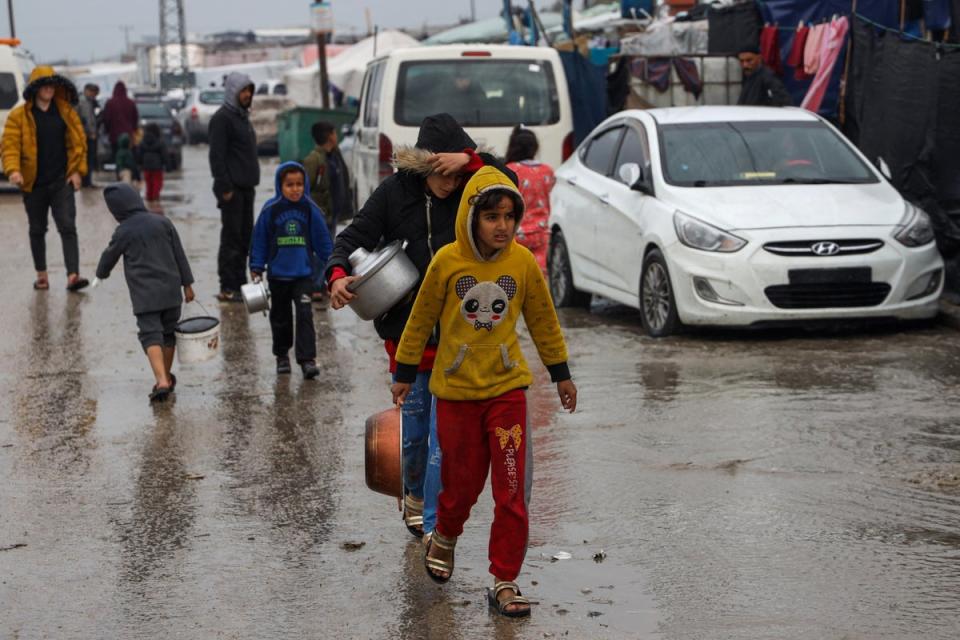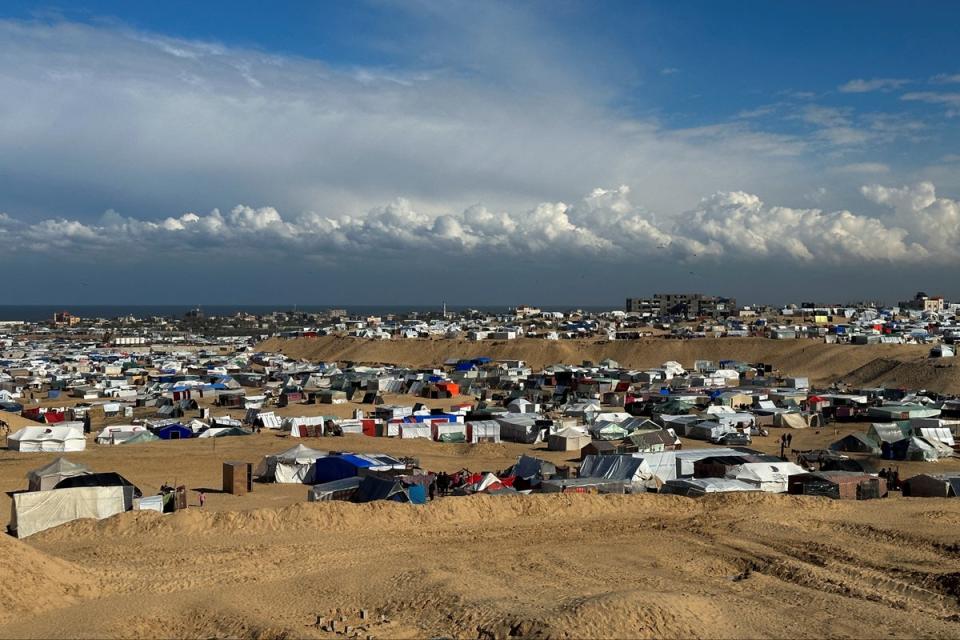Hundreds of thousands trapped near Gaza border with Israeli forces closing in: ‘Rafah was our final refuge’

As Israel says its forces will push on towards the last city on the southern border of Gaza, the hundreds of thousands of Palestinians who have taken refuge in Rafah fear an assault that will leave them with nowhere to turn.
Rafah has seen its population skyrocket in the past four months, with Gaza residents fleeing as far south as they can to escape Israel’s war on Hamas. Many are sleeping in tents, makeshift shelters, schools and mosques.
Early on in the war, it was designated a safe zone by the Israeli military – but it has been hit by Israeli airstrikes on multiple occasions.
“We came here based on what the Israelis said, that it’s a safe place,” Mohammed Al-Jarah, 53, told The Independent. “And now they are threatening us again. Of course, we are afraid.”
Al-Jarah, like many in Rafah, went through an arduous journey to reach the city. After fleeing his home in Gaza City, in the north of the besieged territory, he first moved to the southern city of Khan Younis, before being pushed south into Rafah. He and his wife have taken shelter in a mosque, which has become a shared home with many other families.
“We thought Rafah was our final refuge,” said Abdul Hakim Abou Dagen, 33. “But I think the army will enter Rafah, just as it invaded every other part of Gaza. There is no safe place here.”

Israel launched airstrikes in Gaza, backed up by ground operations and a blockade, in the wake of a Hamas attack inside southern Israel on 7 October which saw around 1,200 people killed and around 240 taken back into Gaza as hostages. Health officials in Hamas-run Gaza say more than 27,000 people have been killed in the near four-month conflict. Imagery analysed by the UN Satellite Centre shows that 30 per cent of Gaza’s buildings have been destroyed or damaged in the Israeli offensive, while Unicef said it estimated that 17,000 children in Gaza were unaccompanied or had been separated from their families.
Dagen and his family have spent the past few months living in tents, and are now dealing with “unbearable cold” as the winter temperatures in Gaza have dropped below 10C. Heavy wind and rain are creating difficult conditions, blowing tents down and turning the ground they are planted on to sludge.
During a visit to the southern city of Khan Younis on Thursday, Israeli defence minister Yoav Gallant told a group of soldiers that the city’s Hamas brigade had been “dismantled” and the “same will happen in Rafah”. Israel launched one of its biggest assaults of the war on Khan Younis last week, in a bid to capture the city which is home to Hamas’s leader in Gaza, Yahya Sinwar.
Gallant said in a statement: “We are achieving our missions in Khan Younis, and we will also reach Rafah and eliminate terror elements that threaten us.”

Rafah is the only part of the territory which has access to the heavily limited food and aid entering the territory, via its border crossing with Egypt. Along with the central area of Deir al-Balah, it is one of the last remaining districts that is yet to be victim of an Israeli ground assault.
Mohammed El-Burai, 43, from Sabra, Gaza City, described the situation in Rafah as “dire”, detailing food and water shortages, and widespread disease. “We have hope in our hearts that this war will end… We knew it would be violent, but not a horror movie.”
The United Nations described Rafah as a “pressure cooker of despair” as Palestinians continued to flee into the city.
“I want to emphasize our deep concern about the escalation of hostilities in Khan Younis, which has resulted in an increase in the number of internally displaced people seeking refuge in Rafah in recent days,” said Jens Laerke, spokesperson for the UN Office for the Coordination of Humanitarian Affairs.
“Thousands of Palestinians have continued to flee to the south, which is already hosting over half the population of some 2.3 million people. Rafah is a pressure cooker of despair, and we fear for what comes next.”
Israel and Hamas appear to be moving closer to a deal for the war’s first extended ceasefire. Mediators from Qatar and Egypt are awaiting a response from Hamas to a proposal drafted last week with Israeli and US spy chiefs, but it is clear there is still a gap to close. Hamas chief Ismail Haniyeh and Palestinian Islamic Jihad chief Ziad al-Nakhala said in a joint statement that “any negotiations should lead to a complete end to the aggression, the withdrawal of the occupation army outside the Gaza Strip, the lifting of the siege” as well as reconstruction, provision of Gaza’s basic needs and a full exchange of captives.


